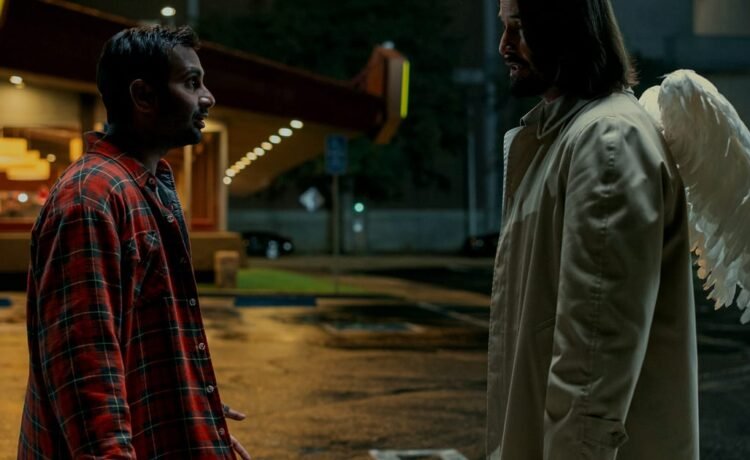
Try as he might, Aziz Ansari can’t quite seem to read the room. One of the more egregious examples of late was the comic’s decision to perform at Saudi Arabia’s Riyadh Comedy Festival. Ansari defended his choice to help culturally launder the régime’s authoritarian reputation on a recent episode of Jimmy Kimmel Live!, pledging to give a portion of the fee he received to Human Rights Watch. The organisation subsequently rejected the donation, a spokesperson telling Variety last week that it could not accept what essentially amounts to blood money.
Ethics under capitalism are a guiding theme of Good Fortune, a high-concept but mostly unremarkable body-swap comedy exploring the death of the American Dream. The actor-turned-filmmaker (who also wrote the script) stars as Arj, a down-on-his-luck documentary editor trying to make ends meet in LA. Having to endure the humiliations of app-based gig work and living out of his car, Arj eventually catches a break when he meets Jeff (Seth Rogen), a venture capitalist tech bro living large in a Bel Air mansion.
Get more Little White Lies
Jeff’s world – snacking on burrata, taking meetings over imported omakase and experimenting with contrast therapy from his personal sauna – bewitches Arj almost immediately. He successfully pitches himself as Jeff’s new assistant, and when he sparks a romantic connection with his co-worker, Elena (a woefully under-utilised Keke Palmer), it feels like his luck is finally turning around.
But it doesn’t last long. Jeff fires him for using the company card on a lavish date with Elena, and he’s back to square one. Exhausted and demoralised, Arj edges towards suicidality as a celestial power watches on from above: a guardian angel named Gabriel (Keanu Reeves) who decides he must intervene. We learn that Gabriel is a low-ranking angel whose primary assignment is to save people from texting-while-driving accidents by tapping them on the shoulder. He envies Azrael (Stephen McKinley Henderson) who wields more responsibility as a shepherd of ‘lost souls’ and has a pair of far larger feathered wings to show for it.
Gabriel identifies Arj as a lost soul and adopts him as a kind of personal project, using his powers to have him trade places with Jeff in the hopes that the experience will give him an appreciation of his own life. Of course the plan backfires, and Arj refuses to switch back. Though the set-up is initially amusing, it quickly wears thin; much of the subsequent runtime is spent waiting for Arj to change his mind, with a newly-humbled Jeff and a dejected, demoted Gabriel, banished from his angelic duties and made to live a human life, toiling in a kitchen as a dishwasher.
“I used to be a celestial being,” he laments. “Now I’m a chain-smoker.” The film’s best comedic moments are often rooted in the delivery of one-liners like these, but the jokes can become repetitive or have negligible impact. There are one too many unfunny Ansari-isms: cutesy turns of phrase like “chicken nuggies,” “burrata boys” or “dum-dum” appear ad nauseam, lines that might have felt less out of place a decade earlier, in the mouth of his quirked-up Parks and Recreation persona.
Good Fortune comes across as similarly underbaked in its attempt at class commentary, gesturing at issues like America’s increasingly untenable income inequality, widespread exploitative working conditions, automation’s role in devaluing human labour, the divisive evils of union-busting and more – but the film doesn’t have anything more sophisticated to say about these matters, other than indicating that the situation is, indeed… bad. Though its heart is in the right place politically, the film still comes across as small-minded, in that it’s only able to imagine individual liberation as a remedy. For Arj (and, it seems, Ansari), the most important things in life are laughing, dancing and eating tacos. It’s a fine sentiment, if a little too pat, especially when the film’s wholly unmerited happy ending boils down to the trickle-down benevolence of the billionaire class.
Unfortunately, the schmaltzy mumblecore sensibilities that made Ansari’s Master of None a successful outing don’t translate in Good Fortune, an observational comedy of paltry observation; a frothy, big studio concoction of little substance and even less style.






